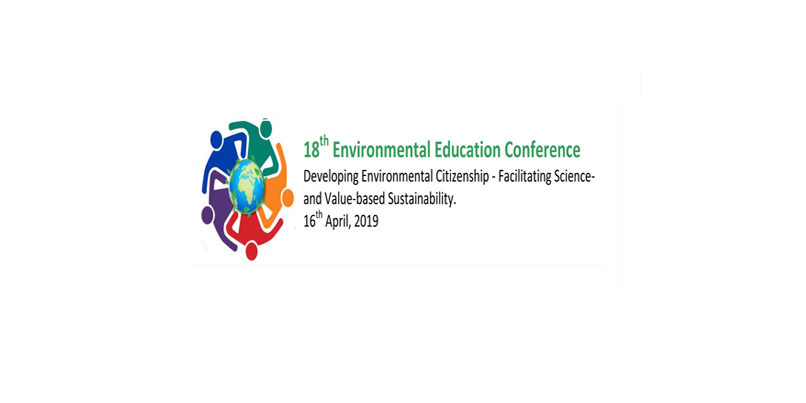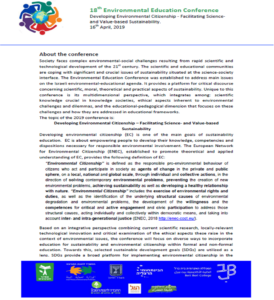18th Environmental Education Conference
Developing Environmental Citizenship – Facilitating Science – and Value-based Sustainability.
Title: Developing Environmental Citizenship – Facilitating Science- and Value-based Sustainability
Time: 16th April 2019
About the conference
Society faces complex environmental-social challenges resulting from rapid scientific and technological development of the 21st century. The scientific and educational communities are coping with significant and crucial issues of sustainability situated at the science-society interface. The Environmental Education Conference was established to address main issues on the Israeli environmental-educational agenda. It provides a platform for the critical discourse concerning scientific, moral, theoretical and practical aspects of sustainability. Unique to this conference is its multidimensional perspective, which integrates among: scientific knowledge crucial in knowledge societies, ethical aspects inherent to environmental challenges and dilemmas, and the educational-pedagogical dimension that focuses on these challenges and how they are addressed in educational frameworks.
The topic of the 2019 conference is:
Developing Environmental Citizenship – Facilitating Science- and Value-based Sustainability
Developing environmental citizenship (EC) is one of the main goals of sustainability education. EC is about empowering people to develop their knowledge, competencies and dispositions necessary for responsible environmental involvement. The European Network for Environmental Citizenship (ENEC), established to promote theoretical and applied understanding of EC, provides the following definition of EC:
“Environmental Citizenship” is defined as the responsible pro-environmental behaviour of citizens who act and participate in society as agents of change in the private and public sphere, on a local, national and global scale, through individual and collective actions, in the direction of solving contemporary environmental problems, preventing the creation of new environmental problems, achieving sustainability as well as developing a healthy relationship with nature. “Environmental Citizenship” includes the exercise of environmental rights and duties, as well as the identification of the underlying structural causes of environmental degradation and environmental problems, the development of the willingness and the competence for critical and active engagement and civic participation to address those structural causes, acting individually and collectively within democratic means, and taking into account inter- and intra-generational justice (ENEC, 2018 https://enec-cost.eu/).
Based on an integrative perspective combining current scientific research, locally-relevant technological innovation and critical examination of the ethical aspects these raise in the context of environmental issues, the conference will focus on diverse ways to incorporate education for sustainability and environmental citizenship within formal and non-formal education. Towards this, selected sustainable development goals (SDGs) are utilized as a lens. SDGs provide a broad platform for implementing environmental citizenship in the academic-scientific, industrial-technological, business, social and private spheres. The conference aspires to inspire and motivate citizen action.
All of the conference sessions will emphasize:
- Connecting among theory, science and educational initiatives that illustrate best practice in addressing ethical dilemmas
- The role of environmental education in cultivating a scientifically-literate citizen, that possesses the values, attitudes and motivation for effective environmental involvement
- The role of available knowledge technology (ICT) that enables citizen science (i.e. civic participation in scientific research) and provides a means for educating the public
- Broader questions: how to educate for critical thinking, comprehending complexity and developing a critical citizenry, cultivating activism and civic involvement
Conference Aims:
- Present scientific and educational activities that exemplify diverse developments toward achieving SDGs that are relevant to environmental citizenship.
- Conduct critical dialogue on ethical-value issues confronting science and academic discourse concerning SDGs.
- Address educational challenges deriving from the theoretical foundations of environmental citizenship (as a field that integrates knowledge, skills and attitudes) and demonstrate how these are addressed in formal and non-formal education.
- Develop and support the type of attitudes that lead to active involvement in coping with environmental issues as opposed to passive dispositions.
Submit a proposal:
You are invited to submit a proposal on one of the following content areas, in one of the following types of presentations:
Content areas:
- Sustainable communities and cities (SDGs 7, 11)
- Urban nature and protecting ecosystems (SDG 15)
- Renewable energy and its implementing in urban settings (SDG 7)
- Climate change in Israel – preparing for the future: designing and implementing public-participatory policy (SDGs 6, 13)
- Empowering individual’s EC for responsible consumerism and use of resources (SDG 9, 12)
- Transportation and infrastructure (SDGs 9, 11)
- Health and sustainable lifestyles –cultivating EC with emphasis on the educational system (SDGs 1, 2, 3)
- Biodiversity and life on land and in oceans with emphasis on the Mediterranean – a challenge for public participation (SDGs 14, 15)
Presentation types:
Stand-alone lecture; Poster; Roundtable; Workshop.
Submissions may also include a proposal for a session (four content-related presentations with opening and conclusion).
Submissions may be any of the following: research / a ‘structured review’ of a selected topic/examples of best practice in education.
Proposals for a workshop must address practical aspects; include a toolbox for achieving SD goals and present ways in which environmental citizenship promotes these.
Final date for submission: 1st December 2018
Instructions for proposals
- Proposal for stand-alone lecture, poster or roundtable presentation:
- Length: 400 words (excluding tables, figures, references)
- Language: English
- Preferred type of presentation: lecture (20 minutes), roundtable presentation (15 minutes), poster (the interactive poster session includes 5-minute presentation of poster), whole session
- Proposal content should include:
- Short introduction – rationale of the study/project/educational intervention
- Background – short, focused and grounded in references
- Methodology
- Results and analysis
- Discussion, conclusions, contribution to academic and/or educational discourse
- Proposal for a whole session should include:
- Description of the rational of the session (< 200 words))
- 400 word abstract (addressing the above-specified) for each presentation
- General summary (< 100 words)
- Workshop (90 minutes)
- <400 words (in Hebrew)
- Method of the workshop
- Title, Contributing participants and their institutions, the content area of the workshop (from the above list), ways by which EC promote the SD goals
All proposals will undergo a review process by an academic panel.
Outstanding student presentation
To increase active student involvement in the conference program, the academic committee will conduct a competition to select two the outstanding student presentations (on research or projects) which will be awarded (equivalent of 500 NIS).
Submission and Registration system
Presenters of all accepted presentation are required to register and pay for the conference.
Conference Proceedings
The conference proceedings of the abstracts will be available to in digital form. Printed versions will be made available by payment.
Peer-reviewed publication
The Israeli Society for Ecology and Environmental Science (ISEES http://www.isees.org.il/?lang=en) will consider publishing a special issue of the peer-reviewed journal ‘Ecology and the Environment – Journal for Science and Environmental Policy’ based on selected papers presented at this meeting. Outstanding submissions will be invited to prepare and submit an expanded version (instructions to be forthcoming).
Proposal should be submitted to the conference website: this will be provided
Call for Presentation_EE conference on Enviornmental Citizenship (2)







